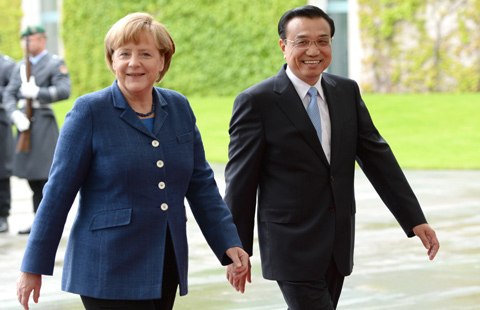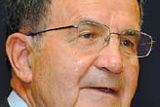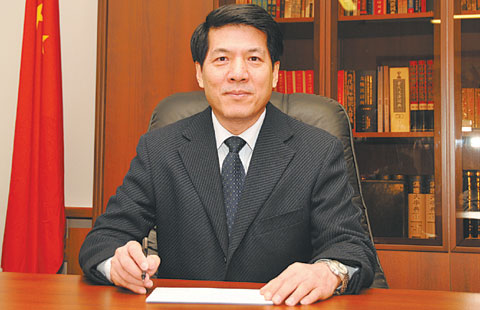
Expert calls for team to boost Li's rail promotion
Comments Print Mail Large Medium Small
|
ON TRACK Premier Li Keqiang's global tour to promote Chinese railways Oct 11-12, 2013 The premier attends a Chinese high-speed railway exhibition in Bangkok. He tells Thai leaders that both countries should strengthen cooperation on infrastructure such as railways, and that China is willing to participate in the construction of a planned high-speed railway between Bangkok and Nong Khai in Northeast Thailand. Oct 13, 2013 Tells Vietnamese leaders during a visit to their country that China would like to help Vietnam with a feasibility study of a railway linking Lao Cai, a border city, with China, Hanoi and Hai Phong. Oct 17, 2013 Tells then-Australian governor-general Quentin Bryce that China is happy to hear that Australia is studying the feasibility of its first high-speed railway and hopes both sides can explore cooperation on the project. Nov 25-26, 2013 Li and 16 government leaders or their representatives in Central and Eastern Europe visit a Chinese infrastructure exhibition in Bucharest, Romania. Li and his Serbian and Hungarian counterparts announce the building of a high-speed railway connecting Belgrade and Budapest. May 4-5, 2014 During his visit to Ethiopia, Li says that both countries should expand cooperation in light-rail and high-speed railways. At a Chinese railway and aviation exhibition at the African Union headquarters, the premier says China will build a high-speed railway research and development center in Africa and share its technology and expertise. May 6-8, 2014 During Li's visit to Nigeria, China Civil Engineering Construction Corp and the Nigerian Federal Ministry of Transport ink a framework agreement to build a coastal railway. May 11, 2014 The premier attends the signing ceremony of an agreement to build a 480-km-long railway between Mombasa and Nairobi in Kenya that will use Chinese technology. June 16-18, 2014 During his visit to the United Kingdom, Li says China and the UK should strengthen cooperation and trade, including infrastructure construction in areas such as nuclear energy and high-speed rail. |
"China has rich expertise and experience in constructing and operating a large-scale high-speed rail network," said Wang Mengshu of the Chinese Academy of Engineering.
China is the only nation in the world that has carried out large and complicated railway projects over the past decade, and some of the projects are in harsh environments such as the high-altitude Qinghai-Tibet Plateau and in bitterly cold Northeast China, he said.
China also has a flexible approach toward funding cooperative programs, he said.
"For instance, when cooperating with some countries with financial problems, China will be responsible for the investment in infrastructure, equipment and technical research, while the other countries will repay their share of the investment with local resources," he said.
But apart from Li's promotion abroad, no government department is taking the lead in drafting a strategy on how to assist enterprises win projects abroad, Wang said.
The then-railway ministry used to help railway enterprises explore overseas markets. The ministry was split into China Railway Corp and the National Railway Administration last year, and the administration has yet to help enterprises gain contracts abroad.
Bearing fruit
The premier has promoted China's high-speed railways during almost all his visits to foreign nations in the past year.
In Asia, Africa, Europe and Australia, Li told government leaders, railway planners and company executives that China's high-speed railway technologies are safe, reliable and economically competitive, and that his nation is willing to enhance cooperation in the railway sector.
Li said during an inspection tour to China Railway Corp in August that he is "very confident" when promoting Chinese high-speed railways in foreign nations.
The export of Chinese high-speed railways will not only drive the export of equipment and the workforce as well, but also strengthen the industry's comprehensive capability through international competition, the premier said.
Li's promotion of China railways has borne fruit, as Chinese enterprises have been selected to take part in the construction of a high-speed rail line between Belgrade, Serbia, and Budapest, Hungary, and a modern route to link Mombasa and Nairobi in Kenya. A high-speed railway research and development center will also be set up in Africa.
Bright future
Railway insiders see many opportunities in the future.
Lu Dongfu, director of China's National Railway Administration, said during a visit in July to the Russian Transport Ministry that the Lanzhou-Urumqi High-Speed Railway, which is set to begin operating before the end of this year, will create opportunities for China and Russia to launch further comprehensive rail cooperation in addition to the agreements announced on Monday.
The new line linking the Xinjiang Uygur autonomous region and inland regions is set to extend further westward to connect with networks in Kazakhstan and then Russia.
Russia has also shown an interest in what was once considered an almost impossible project that Wang, the railway tunnel expert, has advocated: a 13,000-km line that will start in China's northeast and run through eastern Siberia, the Bering Strait, Alaska, Canada and the contiguous United States.
"A senior executive from a Russian state-owned enterprise who is close to the Kremlin has been in contact with me on this initiative, saying they are interested in it," he said.
However, Zhao Jian, a professor of Beijing Jiaotong University who specializes in China's railway system, suggested that technologies used in new lines built by Chinese companies in foreign countries "should not be too complicated" in consideration of the costs and the related countries' capability to maintain sophisticated railway equipment.
Related Stories
Shanxi to build railway equipment manufacturing facility in three cities 2014-10-13 17:37
Renovation project of Xiamen Railway Station in full swing 2014-10-13 14:59
Segment of Datong-Xi'an railway line in Shaanxi 2014-10-10 09:06
Xinjiang's first high-speed railway to start operation in October 2014-10-09 17:59
Railway travel peaks expected as National Day holiday ends 2014-10-09 17:22
China's railway expects record holiday passengers 2014-10-06 07:37
Background






